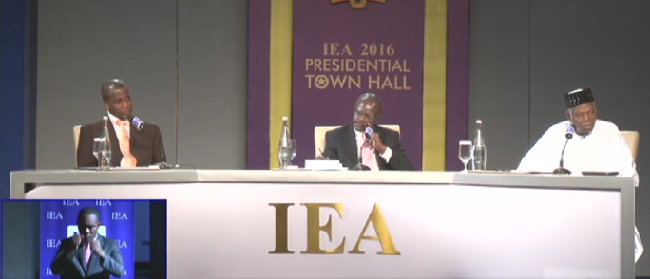
3 Presidential candidates face off at IEA debate
The first of the two presidential debates organised by the Institute of Economic Affairs (IEA) came off to a flying start yesterday, with three presidential candidates, as against the four previously advertised, slugging it out on issues of the economy, energy, job creation and the debt situation.
The event, held in Accra, provided the opportunity for undecided voters in the December 7 elections to have some idea about the presidential candidates and their visions in order to make informed decisions.
The shine on the debate was taken off by the fact that President John Dramani Mahama, the presidential candidate of the National Democratic Congress (NDC); Mr Ivor Greenstreet of the Convention People’s Party (CPP), Nana Addo Dankwa Akufo-Addo of the New Patriotic Party (NPP) and Nana Konadu Agyeman Rawlings of the National Democratic Party (NDP) did not take part in the debate.
But Dr Edward Mahama of the People’s National Convention (PNC), Dr Papa Kwesi Nduom of the Progressive People’s Party (PPP) and Mr Jacob Osei Yeboah, an independent presidential candidate, took advantage of the platform to make a statement that they were a force to be reckoned with.
In their initial separate statements, the three presidential candidates were unanimous in their view that Ghana’s debt was way too high, unemployment was high and corruption was rife in the country.
They, however, expressed varied views on how they intended to address those issues at the debate which was on the theme: “Reinforcing the tenets of Ghana’s democracy”.
Dr Mahama
Expressing his views on the economy and how to manage it if given the nod in the December 7 general election, Dr Mahama said there was too much waste in the country and indicated that a PNC government would cut down the wastage.
He said the inefficiency of public servants was a major contributory factor to the increased debt burden in the country, adding that a PNC government would reduce taxes and widen the tax net.
Besides, he said, when given the mandate as President, he would match income with expenditure, saying: “If you do not spend more, you will have fiscal discipline.”
He said he would take steps to reduce inflation and bring down interest rates.
That, he said, would encourage business people to borrow and increase productivity, underlying the fact that with increased productivity, companies could employ more people.
Dr Mahama said a PNC government would focus on growing the agricultural sector, noting that that sector alone could contribute 10 per cent to the Gross Domestic Product (GDP) per annum.
Besides, he said, his government would reduce the rice import bill by 20 per cent and save the country $500 million used for rice importation yearly.
The PNC presidential candidate said Ghana was running a bloated government, with ministers taking coupons for petrol and living in houses that they did not rent.
He indicated that a PNC government would do away with that arrangement.
Dr Nduom
For his part, Dr Nduom said he intended to have a lean administration with not more than 40 ministers of state and indicated his intention to take politicians out of government and bring in competent civil servants.
“We have to ensure that the right things are done by the civil servants,” he said.
He said a PPP government would grow the agricultural sector and reduce rice importation by $1.2 billion.
He again promised to create a system for Ghanaians to be given the first opportunity to do business, saying: “When our productive energy is brought to bear, we can do better as a country.”
On how to reduce the country’s debt, Dr Nduom said Ghana was in dangerous times and near the heavily indebted poor countries (HIPC) situation.
Therefore, he said, a PPP government would operate a lean government and stop the use of state money to fund political campaign.
Besides, he said, he would promote a National Identification System to bring discipline to the management of the economy.
He said the ID systems would provide unique numbers for the government to know who was buying or renting properties.
He said a PPP government would not borrow to fund what he termed ‘showcase projects’.
Rather, he said, he would ensure that people paid taxes on a regular basis to raise the money to fund projects.
Dr Nduom said corruption was one thing that had put the country into debt, not the fact that the country was poor.
“When we pay debts and fund our projects, Ghana will be a prosperous nation,” he said.
He said a PPP government would make technology the pivot of its operations, saying: “You cannot run an administration in the 21st century without technology.”
Mr Osei Yeboah
Mr Yeboah said his government would industrialise every single resource and indicated that that would form the foundation for the development of the country.
He said he would tap the best human resource in every political party, so that collectively they could develop the country.
“I stand for an all-inclusive government. We will bring everyone on board so that all of us will feel part of the system,” he said.
He said he would create an Upper Parliament to ward off the tyranny of the majority in Parliament.
Another major programme, he said, was the introduction of a national electronic data system to capture the data of all Ghanaians for easy identification and taxation
On the national debt, Mr Yeboah said his government would make the Auditor General to pre-audit spending to bring about fiscal discipline.
